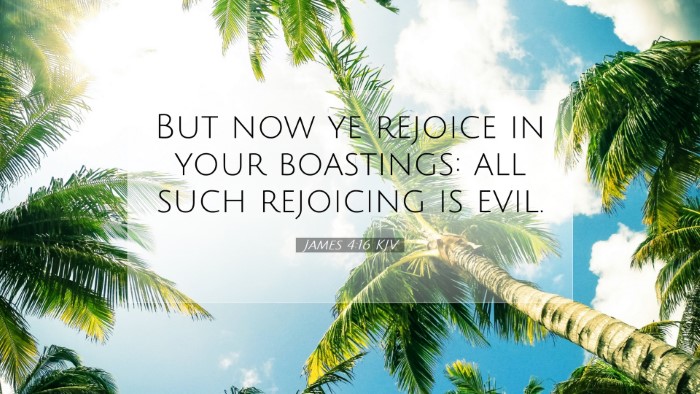Old Testament
Genesis Exodus Leviticus Numbers Deuteronomy Joshua Judges Ruth 1 Samuel 2 Samuel 1 Kings 2 Kings 1 Chronicles 2 Chronicles Ezra Nehemiah Esther Job Psalms Proverbs Ecclesiastes Song of Solomon Isaiah Jeremiah Lamentations Ezekiel Daniel Hosea Joel Amos Obadiah Jonah Micah Nahum Habakkuk Zephaniah Haggai Zechariah MalachiJames 4:16
James 4:16 KJV
But now ye rejoice in your boastings: all such rejoicing is evil.
James 4:16 Bible Commentary
Commentary on James 4:16
James 4:16 reads: "But now ye rejoice in your boastings: all such rejoicing is evil." This verse addresses the heart of human pride and the folly of self-reliance. In this commentary, we will explore the implications of this passage through the insights of esteemed Bible scholars and commentators such as Matthew Henry, Albert Barnes, and Adam Clarke.
Context and Overview
The Epistle of James provides insights into Christian ethics and the practical application of faith. Specifically, in James 4, the Apostle confronts issues of arrogance and the self-centeredness that often accompanies boasting about future plans and achievements.
Understanding the Text
This verse follows a warning against arrogance in making plans without acknowledging God’s sovereignty. Henry emphasizes that such boastful words reflect a mindset devoid of humility, which ultimately leads to separation from God’s will.
The Nature of Boasting
Boasting here is not mere pride but a form of overconfidence in one’s future plans. Barnes notes that rejoicing in such boastings reveals a misunderstanding of the fragility of life and the certainty of God's authority over all affairs. This type of vainglory is condemned as it denotes a reliance on human judgment and disregards divine guidance.
Theological Implications
Both Matthew Henry and Albert Barnes emphasize that the decisive factor in all human planning should be the acknowledgment of God’s will. To rejoice in one’s own plans without considering God's purpose is to invite spiritual danger.
The Sin of Arrogance
James explicitly calls all such rejoicing "evil." This strong language serves to highlight the moral weight of arrogance. Adam Clarke comments on the gravity of this description, pointing out that any reliance on oneself, particularly in spiritual matters, is fundamentally flawed.
Reflection on Human Limitations
Human beings are susceptible to a false sense of security. The act of boasting often stems from ignorance of one’s true limitations and the unpredictability of life. Clarke suggests that acknowledging our mortal limitations helps us to seek divine guidance and lends to a more humble Christian walk.
Contrasting True Rejoicing
Clarke posits that sincere rejoicing should stem from God's grace rather than personal accomplishment. Instead of boasting, believers should find joy in servitude, reliance on the Lord, and the fulfillment of His plans, which align with the broader biblical theme of submission to God's authority.
Practical Application
The message of James 4:16 is profoundly relevant to modern believers. It calls for self-reflection on one’s attitudes and actions in relation to God’s will.
- Humility: Embrace humility in your plans. Recognize that all success comes from God.
- Dependency on God: Cultivate a lifestyle of prayer and dependency on God for guidance in decision-making.
- Community: Engage with fellow believers to ensure accountability and support in maintaining a humble heart.
Conclusion
In closing, James 4:16 serves as a crucial reminder of the folly in human boasting. The insights from esteemed commentators like Henry, Barnes, and Clarke underscore the importance of recognizing our reliance on God’s will and the need for humility in our endeavors. This verse challenges us to examine our hearts, encourage community in faith, and foster a deep reliance on the gracious guidance of our Lord.


